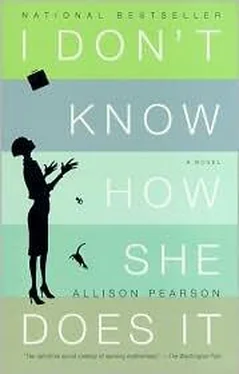I know a woman who wakes her baby at 5:30 every morning so she can have some time with him.
I know a woman who went on a TV discussion program and talked about doing the school run. Her nanny told me she barely knew where her kids’ school was.
I know a woman who heard down the phone from a baby-sitter that her baby took his first steps.
And I know a woman who found out her husband left her from a note that was read out to her by her nanny.
I lie there for a long time in the bed, maybe hours, waiting until I start to feel something. And finally it comes: a feeling both intensely familiar and shockingly strange. It takes me a few seconds to know what it is. I want my mother.
HOWEVER HARD I SEARCH, I can’t come up with a memory of my mother sitting down. Always standing. Standing at the sink holding a pan under running water, standing by the ironing board, standing at the school gate in her good navy coat; bringing in plates of hot food from the kitchen and then clearing them away again. Common sense suggests there must have been an interval between bringing the plates in and taking them out when she sat down and ate with us, but I don’t remember it. Dishes, once they were let out of cupboards, became a “mess” to my mother, and a mess needed clearing up. You could still be in mid-forkful, but if the plate looked empty Mum would whisk it away.
My mother’s generation was born for service; it was their vocation and their destiny. The gap between school — routine, things you do because you must, bad smells — and motherhood — routine, things you do because you must, bad smells — was a matter of a few years. Those fifties girls had a window of freedom, but the window was seldom wide enough to climb through, and anyway what would become of them if they got out? Women like my mum didn’t expect much of life, and in general life did not disappoint them. Even when the men they served ran out on them or died too early from strokes and disorders of the stomach, they often stayed at their posts — preparing meals, hoovering, grabbing any ironing that was going from their children or grandchildren and never sitting down if they could possibly help it. It was as though they defined themselves in doing for others, and the loss of that definition left them blurred, confused: like the pit ponies who kept their tunnel vision long after they had been let loose in a field.
For my generation, coming to it later and sometimes too late, motherhood was a shock. Sacrifice wasn’t written into our contract. After fifteen years as an independent adult, the sudden lack of liberty could be as stunning as being parted from a limb; entwined with the intense feeling of love for your baby was a thin thread of loss, and maybe we will always ache like an amputee.
What my mum still calls Women’s Liberation had just about taken off by the time I was born, but it never reached the parts where my parents lived and, to a remarkable extent, still hasn’t. (If you live in London and read only certain newspapers, you would think that equality was a done deal, not some futuristic experiment still under scrutiny in select laboratories by men in white coats.) One summer, my mother grew her perm out and had her hair cut short in a feathery style that flattered her elfin features. Julie and I loved it, she looked so pretty and cheeky, but when my dad came in that night he said, “It’s a bit Women’s Lib, Jean,” and the style was grown out without fuss, without any more needing to be said.
As I entered my teens, it occurred to me that things were not what they seemed: although the men round our way took all the leading roles, it was the women who were running the show, but they were never allowed to be onstage. It was a matriarchy pretending to be a patriarchy to keep the lads happy. I always thought that was because where I came from people didn’t get much of an education. Now I think that’s what the whole world’s like, only some places hide it better than others.
IN THE PLAYGROUND, the children’s cries fill the air like starlings. The school is a red-brick building, with tall churchy windows, dating from an era when people had faith both in God and education. Over in the far corner, next to the climbing frame, there is a woman in a navy three-quarter coat bending down. When she straightens up, I can see she is holding a handkerchief which is attached to the bloody nose of a small girl.
My mother is a nursery school assistant. She’s been here for years now and basically she runs the place, but they still call her an assistant. Because they can get away with it — Mum doesn’t like to make a fuss — and because it means they can pay her less. The money’s terrible. When she told me how much I shouted with dismay; I could blow it on cab fares in three days. But if you use words like exploitation, my mother just laughs. Says she likes the job, it gets her out of the house. Besides, she has a way with children. If your three-year-old had a bleeding nose, believe me, you’d want my mother to be the one holding her hand. Jean Reddy is one of those souls who exude comfort like a human hot-water bottle.
When she looks across the yard, she knows it’s me instantly, but it takes another second before the pleasure floods into her face. “Oh, Kathy, love,” she says, coming over with the wounded tot in tow, “what a lovely surprise. I thought you were in America.”
“I was. Got back a couple of days ago.”
When I kiss her cheek, it’s apple cold. “Now, Lauren,” my mother says, addressing the sniffling child, “this is my little girl. Say hello!”
The ringing bell signals the end of Mum’s shift and we go indoors to fetch her bag from the staff room. In the corridor, she introduces me to Val, the headmistress of the primary school. “Oh, yes, Katharine, we’ve heard so much about you. Jean showed me the cutting in the paper. You’ve done very well for yourself, haven’t you?”
I’m eager to get out of here, but my mother enjoys showing me off. The hand she puts on my arm as she steers me between colleagues reminds me of Emily at World Feast Day parading Mummy in front of her friends.
Parked in front of the school, the Volvo is filled with kids’ stuff. “How are they?” Mum asks as we climb in. I tell her they’re fine and with Paula. On the drive to the flat, we pass my old school and she sighs. “Did you hear about Mr. Dowling? Terrible.”
“He took early retirement, didn’t he?”
“Yes. A lass. Can you imagine a young lass doing something like that, Kath?”
Mr. Dowling was my head of history twenty years ago, a blinky soft-spoken man with a vast enthusiasm for Elizabethan England and the poetry of the First World War. A few months ago, some little cow in the fifth form punched his glasses into his face and he took early retirement soon after. Mr. Dowling, an archetypal grammar-school boy, had become one of the casualties of the comprehensive system — a doctrine of equality which means that all the kids round here who want to learn something are in classes with kids who don’t.
“They’ll expect you to have read widely, Katharine, but we’ve very little time,” Mr. Dowling said to me when he was preparing me for Cambridge entrance. I was the only one in my year, the only one for as long as anyone could remember except Michael Brain, who got to Oxford to read law and was now at the Bar, which we were told had nothing to do with pubs. It was after school, in Mr. Dowling’s office off the library, with the electric fire with just one bar working. I loved being in there with him, reading and hearing the click of the filaments. We did the Chartists in a day, the First World War in a weekend. “You won’t know everything, but I think we can give an impression of you knowing the ground,” my teacher said. But I had the famous Reddy memory; England under the Tudors and Stuarts, the Ottoman Empire, witchcraft. I had the dates of battles down pat, the way my father memorized the pools: Corunna, Bosworth, Ypres — Raith Rovers, Brechin City, Swindon Town. We could wing anything, Dad and me, if we thought it would pay. Walking up the steps to take my seat alone in the exam room I knew I could do it, if I could only hold the knowledge in there for long enough. Must remember.
Читать дальше












